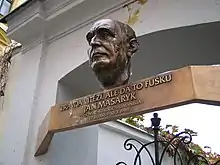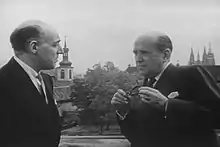Jan Masaryk
Jan Garrigue Masaryk (14 September 1886 – 10 March 1948) was a Czechoslovak diplomat and politician who served as the Foreign Minister of Czechoslovakia from 1940 to 1948. American journalist John Gunther described Masaryk as "a brave, honest, turbulent, and impulsive man".[1]
Jan Masaryk | |
|---|---|
 | |
| Foreign Minister of Czechoslovakia | |
| In office 21 July 1940 – 10 March 1948 | |
| President | Edvard Beneš |
| Prime Minister | Jan Šrámek Zdeněk Fierlinger Klement Gottwald |
| Preceded by | German occupation |
| Succeeded by | Vladimír Clementis |
| Czechoslovakia Ambassador to the United Kingdom | |
| In office 1925 – September 1938 | |
| President | Tomáš Garrigue Masaryk Edvard Beneš |
| Personal details | |
| Born | Jan Garrigue Masaryk 14 September 1886 Prague, Austria-Hungary |
| Died | 10 March 1948 (aged 61) Prague, Czechoslovakia |
| Cause of death | Disputed – see text |
| Relations | Tomáš Garrigue Masaryk (father) |
| Religion | Evangelical Church of Czech Brethren |
| 1In exile 1940 – April 1945 | |
Early life
Born in Prague, he was a son of professor and politician Tomáš Garrigue Masaryk (who became the first President of Czechoslovakia in 1918) and Charlotte Garrigue, Tomáš Garrigue Masaryk's American wife. Masaryk was educated in Prague and also in the US, where he also for a time lived as a drifter and lived on the earnings of his manual labor. He returned home in 1913 and served in the Austro-Hungarian Army during the First World War.[2] He then joined the diplomatic service and became chargé d'affaires to the US in 1919, a post he held until 1922. In 1921, he became secretary to the Czech foreign minister Edvard Beneš. In 1925, he was made ambassador to Britain.[3] His father resigned as President in 1935 and died two years later. He was succeeded by Edvard Beneš.
Wartime
In September 1938 the Sudetenland was occupied by German forces and Masaryk resigned as ambassador in protest, although he remained in London. Other government members including Beneš also resigned. In March 1939 Germany occupied the remaining parts of the Czech provinces of Bohemia and Moravia, and a puppet Slovak state was established in Slovakia. When a Czechoslovak government-in-exile was established in Britain in 1940, Masaryk was appointed Foreign Minister. During the war he regularly made broadcasts over the BBC to occupied Czechoslovakia.[4] He had a flat at Westminster Gardens, Marsham Street in London but often stayed at the Czechoslovak Chancellery residence at Wingrave or with President Beneš at Aston Abbotts, both near Aylesbury in Buckinghamshire. In 1942 Masaryk received an LL.D. from Bates College.
After the war
Masaryk remained Foreign Minister following the liberation of Czechoslovakia as part of the multi-party, communist-dominated National Front government.[5] The Communists under Klement Gottwald saw their position strengthened after the 1946 elections but Masaryk stayed on as Foreign Minister.[5][6] He was concerned with retaining the friendship of the Soviet Union, but was dismayed by the veto they put on Czechoslovak participation in the Marshall Plan.[5][6]
Czechoslovakia sold arms to Israel during the 1948 Arab–Israeli War. The deliveries from Czechoslovakia proved important for the establishment of Israel. Masaryk personally signed the first contract on 14 January 1948.[7] Because Masaryk was viewed as the most sympathetic to the Jews of members of the postwar government, he was given the task of "appeasing Jewish organisations in the west" in terms of the government's plans to expel the country's German population, including German Jews.[8]

In February 1948 the majority of the non-communist cabinet members resigned, hoping to force new elections, but instead a communist government under Gottwald was formed in what became known as the Czech coup (Victorious February in the Eastern Bloc).[5][6] Masaryk remained Foreign Minister, and was the only prominent minister in the new government who was neither a Communist nor a fellow traveller.[6] However, he was apparently uncertain about his decision and possibly regretted his decision not to oppose the communist coup by broadcasting to the Czech people on national radio, where he was a much loved celebrity.
Masaryk served as the President of the World Federation of United Nations Associations. A memorial to his memory and his presidency of the Organisation is located in Geneva, Switzerland. Flowers are laid annually by the Permanent Representative of the Czech Republic to the United Nations.
Death


On 10 March 1948 Masaryk was found dead, dressed only in his pyjamas, in the courtyard of the Foreign Ministry (the Černín Palace in Prague) below his bathroom window.[9] The Ministry of the Interior claimed that he had committed suicide by jumping out of the window, but it was at the time, and is still, widely assumed that he was murdered on behest of the nascent Communist government.[5][9][10] (Others in the country put it thus: "Jan Masaryk was a very tidy man. He was such a tidy man that when he jumped he shut the window after himself.") On the other hand, many of his close associates (e.g. his secretary Antonín Sum, or Viktor Fischl) have always defended the suicide story.
In a second investigation taken in 1968 during the Prague Spring, Masaryk's death was ruled an accident, not excluding a murder[11] and a third investigation in the early 1990s after the Velvet Revolution concluded that it had been a murder.
In his 1981 autobiography History and Memory, US Ambassador Charles W. Yost, a friend of Masaryk who worked with him in Prague in 1947, and also a friend of Masaryk's fiancé Marcia Davenport, wrote, "The Communists used him and, when his usefulness was past, flung him out of a window to his death."
Discussions about the mysterious circumstances of his death continued for some time.[9] Those who believe that Masaryk was murdered called it the Third Defenestration of Prague, and point to the presence of nail marks on the window sill from which Masaryk fell, as well as smearings of feces and Masaryk's stated intention to leave Prague the next day for London. Members of Masaryk's family—including his former wife, Frances Crane Leatherbee, a former in-law named Sylvia E. Crane, and his sister Alice Masaryková — stated their belief that he had indeed killed himself, according to a letter written by Sylvia E. Crane to The New York Times, and considered the possibility of murder a "cold war cliché".[12][13] However, a Prague police report in 2004 concluded after forensic research that Masaryk had indeed been thrown out of the window to his death.[14] This report was seemingly corroborated in 2006 when a Russian journalist claimed that his mother knew the Russian intelligence officer who threw Masaryk out of the window of the west bathroom of Masaryk's flat.[15]
The highest-ranking Soviet Bloc intelligence defector, Lt. Gen. Ion Mihai Pacepa, described his conversation with Nicolae Ceauşescu, who told him about "ten international leaders the Kremlin killed or tried to kill". Jan Masaryk was one of them.[16]
Czech historian Václava Jandečková has tentatively suggested in her 2015 monograph "Kauza Jan Masaryk: Nový pohled"[17] (The Jan Masaryk Case: A New Perspective) that Masaryk might have been murdered by Jan Bydžovský and František Fryč, who believed they were working for the British intelligence service SIS, but most probably fell victim to NKVD agents. Bydžovský confessed to murdering Masaryk when interrogated in prison by the Czech secret police StB in the 1950s (in an unrelated case); but later denied it. Jandečková argues that this confession cannot be so easily dismissed as has been believed, especially since Bydžovský certainly was not hallucinating or drugged, and the interrogators seem to have been surprised by his confession (at his trial, the Masaryk murder was not "used" or even mentioned, although a separate re-investigation by the StB continued for more than a year).
Private life
From 1924 until their divorce in 1931, Masaryk was married to Frances Crane Leatherbee (1887-1954). An heiress to the Crane piping, valves and elevator fortune, and the former wife of Robert Leatherbee, she was a daughter of Charles R. Crane, a U.S. minister to China; and a sister of Richard Teller Crane II, a U.S. ambassador to Czechoslovakia. By that marriage, Masaryk had three stepchildren: Charles Leatherbee, Robert Leatherbee Jr., and Richard Crane Leatherbee.[18] Stepson Charles Leatherbee (Harvard 1929) co-founded the University Players, a summer stock company in Falmouth, Massachusetts, in 1928 with Bretaigne Windust. He married Mary Lee Logan (1910-1972), younger sister of Joshua Logan, who became one of the co-directors of the University Players in 1931.[19]
Masaryk was a skilled amateur pianist. In that capacity, he accompanied Jarmila Novotná in a recital of Czech folk songs issued on 78 RPM records to commemorate the victims of the Nazi eradication of Lidice.[20]
He is reputed to have had an exquisite sense of humour. It is reported that when he was a young Czechoslovak Ambassador to the US, he attended many parties and once the hostess invited him to play the violin. Accepting graciously, he played a Czech nursery song to enthusiastic applause from the audience. Leaving the party with a friend, he was asked why had he been asked to play the violin, to which he replied: "Oh, it's all very simple-- don't you see? They have mixed me up with my father; they mixed him up with Paderewski. And they mixed the piano up with the violin."[21]
At the time of his death, Masaryk was reportedly planning to marry the American writer Marcia Davenport.
Jan Masaryk Medal
The Honorary Silver Medal of Jan Masaryk, in Czech: Stříbrná medaile Jana Masaryka, also Pamětní stříbrná medaile Jana Masaryka, or Stříbrná medaile Jana Masaryka Ministerstva zahraničních věcí České republiky - is awarded by the Ministry of Foreign Affairs of the Czech Republic and is one of the highest awards that can be received by foreign nationals.[22][23]
See also
- A Prominent Patient, a 2017 film
- List of unsolved deaths
References
- Gunther, John (1961). Inside Europe Today. New York: Harper & Brothers. p. 335. LCCN 61-9706.
- PRECLÍK, Vratislav. Masaryk a legie (TGM and legions), váz. kniha, 219 str., vydalo nakladatelství Paris Karviná, Žižkova 2379 (734 01 Karviná) ve spolupráci s Masarykovým demokratickým hnutím (Masaryk democratic movement in Prague), 2019, ISBN 978-80-87173-47-3
- Carey, Nick (12 April 2000). "Czechs in History: Jan Masaryk". Radio Prague. Retrieved 28 October 2012.
- Masaryk, Jan (2011). Speaking to My Country. Lexington MA: Plunkett Lake Press. Archived from the original on 2012-03-16. Foreword by Madeleine Albright.
- Cook, Bernard A. (2001) Europe Since 1945: An Encyclopedia, Volume 1, p. 251 New York: Taylor & Francis
- Owen, John M. (2010) The Clash of Ideas in World Politics, p. 185 Princeton, NJ: Princeton University Press
- Howard M. Sachar (24 March 2010). Israel and Europe: An Appraisal in History. Knopf Doubleday Publishing Group. pp. 56–. ISBN 978-0-307-48643-1.
Early in 1947...Czech weaponry might be available...personally approved by...Jan Masarik. Ideology played no role in these initial transaction. They were exclusively commercial
- Láníček, Jan (2013). Czechs, Slovaks and the Jews, 1938-48: Beyond Idealisation and Condemnation. New York: Springer. pp. 121–122. ISBN 978-1-137-31747-6.
- Axelrod, Alan (2009) The Real History of the Cold War: A New Look at the Past, p. 133 New York: Sterling Publishing Co., Inc.
- Horáková, Pavla (11 March 2002). "Jan Masaryk died 54 years ago". Radio Prague. Retrieved 4 April 2009.
- "Books: Murder Will Out". Time. January 12, 1970. Retrieved May 5, 2010.
- Crane, John O. & Sylvia E. (1991) Czechoslovakia: Anvil of the Cold War, pp. xiv, 321-323 New York: Praeger
- "East Europe Could Shed Light on Trotsky and Some Americans; Masaryk a Suicide". The New York Times. January 28, 1990. Retrieved May 5, 2010.
- Cameron, Rob, "Police close case on 1948 death of Jan Masaryk - murder, not suicide", Radio Prague, 06-01-2004.
- Cameron, Rob, "Masaryk murder mystery back in headlines as Russian journalist speaks out", Radio Prague, 18-12-2006.
- The Kremlin’s Killing Ways, at National Review Online, by Ion Mihai Pacepa; published November 28, 2006; retrieved October 15, 2015
- "Kauza Jan Masaryk (nový pohled) - Doznání k vraždě a tajný přešetřovací proces StB z let 1950–1951". www.bux.cz (in Czech). Retrieved 2017-05-17.
- Leatherbee, Richard, "My Family Tree, 1772 - present" Archived 2007-09-30 at the Wayback Machine, genealogyboard.com, December 13, 2005.
- See, Houghton, Norris. But Not Forgotten: The Adventure of the University Players. New York, William Sloane Associates: 1951.
- Crutchfield, Will, "CLASSICAL MUSIC; Once, the Voice Was Melody Itself. In Fact, It Still Is", The New York Times, March 7, 1993, accessed October 30, 2008.
- Clifton Fadiman (ed.) The Little Brown Book of Anecdotes, Little Brown, Boston 1985, p. 389
- de:Jan-Masaryk-Medaille
- https://www.mzv.cz/jnp/en/issues_and_press/archive/events_and_issues/x2017/x2017_11_02_jan_masaryk_medal_to_james_denton.html
Further reading
- Claire Sterling (1969). The Masaryk Case. New York: Harper & Row.
- Jan Masaryk (2011). Speaking to My Country. Lexington MA: Plunkett Lake Press. Foreword by Madeleine Albright
- Marcia Davenport (1967). Too Strong for Fantasy. New York: Charles Scribner's Sons.
External links
| Wikimedia Commons has media related to Jan Masaryk. |
| Government offices | ||
|---|---|---|
| Preceded by German occupational ministry |
Minister of Foreign Affairs of Czechoslovakia 1945–1948 |
Succeeded by Vladimír Clementis |